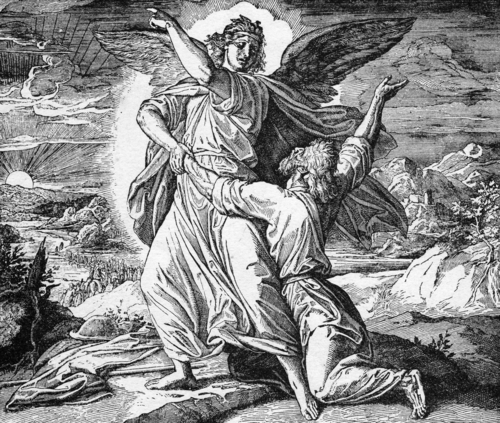What Makes Jesus’ Ascension Important? – Q&A for May 13, 2021
/0 Comments/in Q&A Transcripts/by David GuzikWhat Makes Jesus’ Ascension Important? – LIVE Q&A for May 13, 2021
/0 Comments/in Q&A Podcast/by David GuzikFrom Defeat to Victory – 1 Kings 8:33-34 – May 13 2021
/0 Comments/in Enduring Words for Troubled Times/by David GuzikA Healthy Church – Acts 2:42- May 12 2021
/0 Comments/in Enduring Words for Troubled Times/by David GuzikThe Answer of Faith to the Advice of Fear – Psalm 11:1, 3-4 – May 11 2021
/0 Comments/in Enduring Words for Troubled Times/by David GuzikUnnecessary Trouble – 2 Kings 14:13-14 – May 10 2021
/0 Comments/in Enduring Words for Troubled Times/by David GuzikA Blessing There?
/0 Comments/in For Pastors, Preachers, Bible Teachers/by David GuzikDear Pastor, Preacher, or Bible Teacher –
And He blessed him there. (Genesis 32:29)
You know the great story of when the “Man” wrestled with Jacob, recorded in Genesis 32. It’s a wonderful preaching and teaching passage, full of deep truth and application.
I would like you to focus on one word in half a verse. The half verse is the second half of Genesis 32:29: And He blessed him there. The one word is there.

We often want to tell God not only that He must bless us, but we also tell Him where He must bless us. “Lord, put me into a great place. A place of influence, prosperity, comfort, and success. Put me in that place and bless me there!”
Where did God bless Jacob? At Penuel, the place where God Himself wrestled with Jacob, defeated him, and put Jacob in his place.
When we read, and He blessed him there, surely, this was the blessing of being defeated by God. It was the blessing of the passing of the old life (the Jacob life), and the coming of a new life, (the Israel life).
At that place, notice that God blessed him there – at that particular place.
God blessed Jacob there, at the place of special trial and testing.
God blessed Jacob there, at the place of intense pleading to God.
God blessed Jacob there, at the place of seeing the face of God.
God blessed Jacob there, at the place of conscious weakness.
Does God have you in that kind of place right now? Don’t think for a moment that you have to go somewhere else to receive profound blessing from God. You may be in the place of blessing right now – you just thought it would look different.
Make it your prayer: “Lord, You blessed Jacob there – You can bless me here. I surrender to You just as Jacob surrendered to You and received Your best.”
Blessings to you in Jesus’ Name – David Guzik
Click Here to Receive Email from David for Pastors, Preachers, and Bible Teachers
Praying for Trouble
/0 Comments/in Weekly Devotional/by David GuzikNow, Lord, look on their threats, and grant to Your servants that with all boldness they may speak Your word, by stretching out Your hand to heal, and that signs and wonders may be done through the name of Your holy Servant Jesus. (Acts 4:29-30)
Prayer is much more than asking God for things. Sometimes we get into a bad habit of thinking that if we don’t ask God to do something, we aren’t really praying. But prayer can be and should be rich with praise, thanksgiving, declaring the glory of God, listening to God, enjoying His presence, humble worship, and more.
While prayer is more than asking God for things, it isn’t wrong to ask our Father in heaven for His help, guidance, empowering, and blessing! In Acts 4, the disciples of Jesus had a prayer meeting after Peter and John had been threatened and released when the appeared before the religious council. In their prayer the honored God, gave Him glory, and prayed the Scriptures. Acts 4:29-30 tells us what they finally asked for.

The disciples asked God to look on their threats. “Lord, look at the powerful men who oppose us. They seem to have every advantage, but we are safe in You, as long as you will look on their threats.
The disciples asked God for boldness. “Lord, we want to be more bold – not less! The council wants us to be so afraid of their threats that we won’t talk about Jesus. We don’t want to be afraid of them, so please give us boldness.”
The disciples asked for boldness to speak God’s word. “Lord, our message is not ourselves or even our story. Give us boldness to proclaim the best message we can – Your word.”
The disciples asked that signs and wonders may be done through the name of Your holy Servant Jesus. “Lord, all this trouble started with a miracle at the temple. Please do more of those kinds of miracles!”
All of these requests were consumed with God’s cause and glory, not with the comfort and advancement of the disciples. The disciples prayed for things that would lead to more confrontation and trouble, not less.
I don’t know if I have ever really prayed, “God, please send me more trouble.” I usually pray that God would take my troubles away! But I want to have the heart that these first disciples of Jesus had. They cared more about the glory of God and the souls of men than they cared about their own comfort and ease. If God could work through their trouble to His glory and to bring more men and women into the kingdom, they wanted God to send more trouble!
I don’t expect you to pray, “Lord, send more trouble.” But today, you can pray this: “Lord, I need Your boldness to speak Your word and I want to see You do great things. If that means more trouble, so be it!” Let’s pray like these early disciples.
Orar la Palabra de Dios
/0 Comments/in Devocional Semanal/by David Guzik“Que por boca de David tu siervo dijiste:
¿Por qué se amotinan las gentes,
Y los pueblos piensan cosas vanas?
Se reunieron los reyes de la tierra,
Y los príncipes se juntaron en uno
Contra el Señor, y contra su Cristo.
Porque verdaderamente se unieron en esta ciudad contra tu santo Hijo Jesús, a quien ungiste, Herodes y Poncio Pilato, con los gentiles y el pueblo de Israel, para hacer cuanto tu mano y tu consejo habían antes determinado que sucediera” (Hechos 4:25-28).
Puedes aprender mucho sobre una persona escuchándola orar y puedes aprender mucho sobre una iglesia a través de sus reuniones de oración. En Hechos 4 vemos una reunión de oración de la iglesia primitiva y nos muestra cosas maravillosas sobre ella. Su oración comenzó con tres principios importantes (Hechos 4: 23-24) y en Hechos 4:25 nos muestra algo más importante acerca de la oración.

Cuando la iglesia primitiva oró en Hechos 4, oraron la palabra de Dios. No sabemos específicamente quién dijo estas palabras específicas, pero expresaron el corazón unificado de toda la reunión de oración. Dijeron, por boca de David tu siervo dijiste. Este era el corazón de todos los discípulos en la reunión de oración (recuerde que oraron unánimes). Reconocían que las palabras del Antiguo Testamento (Salmo 2 para ser exactos) realmenteeran las palabras de Dios. Dios estaba hablando por boca de David [Su] siervo.
Este es un punto importante. Los apóstoles y profetas creían que las palabras del rey David, registradas en el Salmo 2, realmente eran las palabras del Señor Dios, dichas por boca del rey David. Los primeros cristianos tenían una alto concepto de las Sagradas Escrituras.
¿Por qué se amotinan las gentes, y los pueblos piensan cosas vanas? Su oración unificada citó el Salmo 2, porque los discípulos citaron el Salmo 2, porque él y los otros discípulos entendían lo que sucedía al ver lo que la Biblia había dicho al respecto. Del Salmo 2, entendían que debían esperar este tipo de oposición y no preocuparse por ello porque Dios estaba en control de todas las cosas.
Cuando oramos, debemos ver nuestras circunstancias a la luz de la Palabra de Dios. En conflicto, vemos la batalla espiritual (Efesios 6:12). Cuando hay pecado, confesamos y nos arrepentimos (Salmo 32: 3-4). Cuando necesitamos fuerza, confiamos en las promesas de Dios (Efesios 3:16).
Con esta confianza podían decirle a Dios: Haz cuanto tu mano y tu consejo habían antes determinado que sucediera. Debido a que veían sus circunstancias a la luz de la Palabra de Dios, podían reconocer que la ira del hombre nunca opera fuera de la esfera del control de Dios; estos enemigos de Jesús solo podían hacer lo que la mano de Dios les permitiera.
Esto trae verdadera paz, saber que todo lo que se me presente ha pasado primero por la mano de Dios y que Él no permitirá que ni siquiera los actos más malvados de los hombres resulten en un daño permanente.
Hoy, permita que la palabra de Dios le dé la confianza y la paz de que Él tiene el control.





